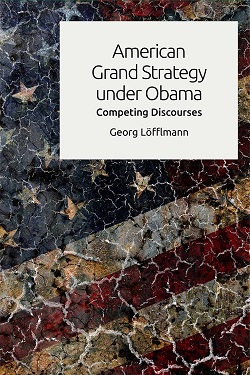The ‘Obama Doctrine’ in foreign policy – un-American isolationism, or a pragmatic response to changing priorities?
-
 The United States overwhelmingly views itself as the world's 'indispensable nation' and leader of the free world
The United States overwhelmingly views itself as the world's 'indispensable nation' and leader of the free world -
This view is expressed not only in political rhetoric but also in academia, media, and popular culture
-
Obama's focus on military restraint and burden-sharing with US allies and partners presented a challenge to the idea of American exceptionalism
-
The 'Obama Doctrine' was accused of accepting or even hastening American decline
-
This identity conflict opened the door to Donald Trump and his promise to 'make America great again'.
In a new book published today, Dr Georg Löfflmann explores American identity, US foreign policy and national security during the Obama presidency, and asks whether the ‘Obama Doctrine’ was an effective response to the tension between an increasingly multi-polar world and a US elite still convinced that America has a unique call to global dominance.
American Grand Strategy under Obama: Competing Discourses presents a detailed analysis of US foreign policy and national security under the Obama administration, considers how Obama's strategic vision resonated in American politics and society, and finds a President whose foreign policy pleased neither Republicans, Democrats nor the Washington elite.
President Obama was elected at a time when US hegemony was under question, due to the failure of the Iraq War, the impact of the global financial crisis and the rise of rival powers like China and Russia. Despite this, Hollywood blockbusters, US media and the political rhetoric of think-tanks, military leaders and Washington insiders still held to an idealised vision of America exceptionalism, in which US global dominance is a necessary burden with which the nation is uniquely tasked to protect the liberal international order.
Dr Löfflmann argues that President Obama’s strategic approach of “burden sharing” and “leading from behind” sought to lessen the costs and commitments of global leadership, but presented a fundamental challenge to established ideas of US identity – so fundamental that the Obama Doctrine was accused of accepting or even hastening American decline by the Washington establishment.
The Obama Doctrine tried and failed to use the rhetoric of American exceptionalism to legitimate a policy course of pragmatism, multilateralism and military restraint, and instead deepened a profound identity crisis about America’s role in the world. This crisis of confidence among Americans about their country’s future would be exploited to the fullest by Donald Trump and his promise to 'make America great again'.
Dr Löfflmann said: “One of the most surprising findings of the book was how Obama's approach seemed to please almost no one in the wider Washington foreign policy establishment.”
“To the neoconservatives and Republicans, Obama's caution and pragmatism were only a sign of dangerous weakness - they saw Obama as an apologist for American power, who never fully grasped the country's exceptional responsibility to defend freedom and democracy against the world's evil regimes.“
“To many liberal critics and humanitarian interventionists, Obama did not do enough to use US military power to halt grievous human rights abuses, for example, when Obama refused to launch air strikes against Assad in Syria.
“Other critics, who wanted the United States to withdraw from places like Afghanistan and rein in ballooning defense expenditures, saw Obama as just another misguided follower of American primacy and imperialism.”
Reflecting on recent political developments, Dr Löfflmann added: “Interestingly, Donald Trump would launch his 'America First' platform as a full-blown attack on the Washington establishment, which had proved so resistant to President Obama’s relatively moderate adjustments.”
“According to Trump, the Washington elite’s misguided policies, from free trade to military intervention have let the American people down and betrayed the national interest. In this anti-establishment critique of US hegemony there is actually quite some continuity between Trump and Obama, even if their rhetoric and policies could not be farther apart.”
- Dr Löfflmann further explores President Trump’s challenge to the Washington foreign policy establishment in “From the Obama Doctrine to America First: the erosion of the Washington consensus on grand strategy”, International Politics, Feb 2019. Available at: https://doi.org/10.1057/s41311-019-00172-0
28 February 2019
NOTES
American Grand Strategy Under Obama: Competing Discourses by Dr Georg Löfflmann is published today in paperback by Edinburgh University Press. Paperback: 240 pages. ISBN: 9781474445733
Dr Georg Löfflmann is Teaching Fellow for US Foreign Policy and American Politics in the Department of Politics and International Studies, University of Warwick. His research interests focus on the interaction of security and identity, discourse and practice, and the role of the everyday in shaping politics, with research broadly located within critical security studies and related fields, such as critical geopolitics.
CONTACT
Sheila Kiggins
Media Relations Manager, Social Science
University of Warwick
S.Kiggins@warwick.ac.uk
02476 150423
07876 218166
